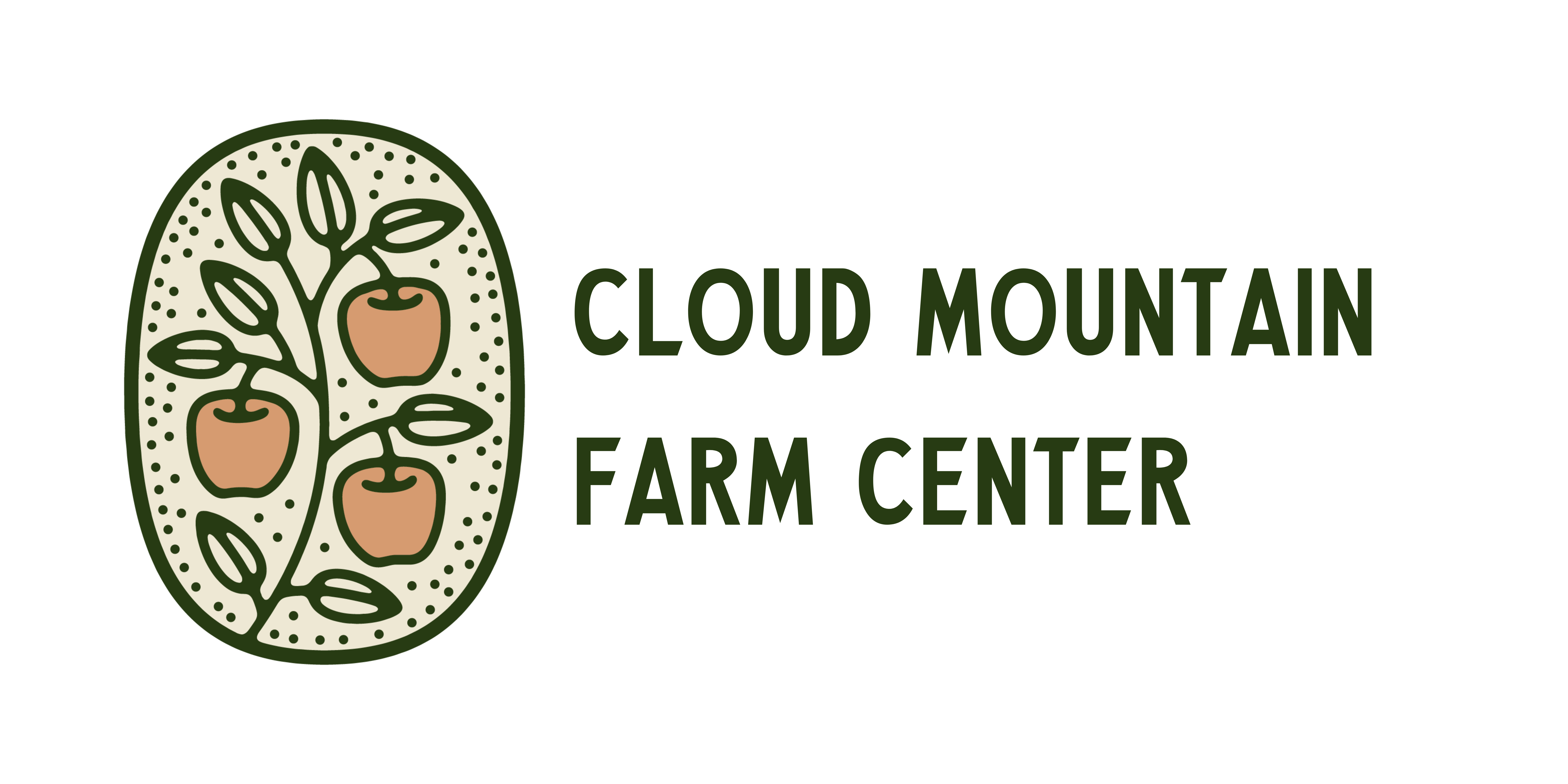Download a pdf of Plants for Problem Places: Wet Soil
Do you have soil that is saturated in winter? Do you dig a hole in March, just to watch it fill with water? Do you sometimes have standing water several days after heavy rain? You could build raised beds on top of such soil, or trench the area and lay drainage tiles. Or, you could choose plants that tolerate these conditions. We’ve put together a list of plants that will tolerate and even thrive in winter saturated soils.
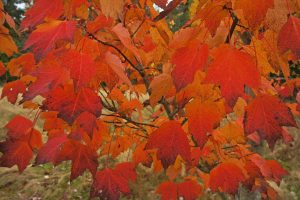
Acer rubrum fall color
Trees
- Acer rubrum and Acer x freemanii The Red maples, like Red Sunset, October Glory, and Burgundy Belle, are fast growing, deciduous trees, reaching 40′ or more in time. Good shade trees, and great fall color.
- Betula species Moderate to fast growing deciduous trees, most reaching 30′-50′ in time. Very ornamental bark, and some have good fall color.
- Liquidambar styraciflua Moderate sized deciduous tree with good fall color and interesting corky bark. 40′-60′ in time.
- Quercus palustris Pin Oak. Large growing shade tree with pyramidal form and late fall color.
- Metasequoia glyptostroboides Dawn Redwood. Large deciduous conifer, growing to 50′-60′, pyramidal form, golden fall color. Variegated and golden foliaged forms are available.
- Nyssa sylvatica Blackgum or Tupelo. Moderate sized shade tree, growing 30′-40′. Tolerant of flooding. Brilliant fall color.
- Salix sp Small to medium sized shrubby deciduous trees. Many of the willow species and hybrids will tolerate short termed flooding.
- Sequoia sempervirens Coastal Redwood. Fast growing conifer to 80′ or more in time. Tolerant of wet soil but not drought; will burn in cold winter wind.
- Callitropsis (Chamaecyparis) nootkatensis Alaskan Cedar. Slow growing conifer, to 20′-30′ in 20-30 years. Will not tolerate flooding.
Shrubs
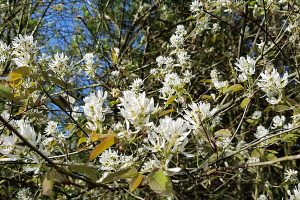
Western Serviceberry in bloom
- Amelanchier sp. Deciduous shrubs, growing 8′-20′, with white spring flowers and edible berries. Several named varieties, including ‘Autumn Brilliance’, also have exceptional fall color.
- Aronia sp. Chokeberry. Deciduous shubs growing 6′-8′ grown for the spectacular fall color. Some varieties have edible berries.
- Cornus sp. Dogwoods. Deciduous shrubs, some PNW natives, with brilliantly colored young wood, growing 18″ to 6′. Many have good fall color as well. Most of these will tolerate standing water.
- Gaultheria shallon Low growing PNW native evergreen, 2′-4′ high, happiest in partial shade. Spreads by runners.
- Hydrangea sp. Most hydrangeas will tolerate winter wet, but are not summer drought tolerant. Perform best with partial shade.
- Sambucus sp. Arching shrubs, some PNW natives, growing to 12′-15′, forms are available that have golden, purple, or variegated foliage. Some are selected for fruit quality. Many also have less tasty berries for the birds.
- Physocarpus sp. Upright deciduous shrubs, one PNW native with others native to the Midwest. They have ornamental bark, various foliage colors available including purple and golden forms. The pollinator attracting flowers are followed by seed heads loved by birds.
- Viburnum sp. Deciduous shrubs, many forms available, tolerant of wet soil but not standing water.
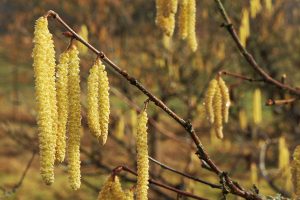
Hazelnut bloom
Fruit Plants
- Mountain Ash hybrids such as Shipova. Small deciduous trees with edible fruit.
- Pears Both European and Asian pears will tolerate heavy soil with occasional standing water.
- Filberts (Hazelnuts) Tolerant of heavy soil, not tolerant of summer drought. Plant 2 varieties for nut set. Grows to 15′-20′.
- Blueberries Many cultivars of blueberries tolerate wet soil. Patriot and Jersey are particularly tolerant.
- Lingonberry and Cranberry Both tolerate winter wet soil, not summer drought.
- Black Currant Tolerates winter wet soil, performs best with summer water.
Perennials
- Anemone sp. Japanese and spring anemones. Spreading perennials with spring or ate summer blooms.
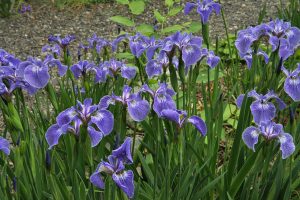
Arctic Iris
- Aquilegea canadensis & formosa Spring blooming native columbines.
- Astilbe sp. Astilbe tolerate wet soil, but cannot take summer drought if in sun.
- Bergenia sp. Evergreen bold textured perennial, tolerates almost any soil, can take sun or shade.
- Iris ensata, Iris siberica, Iris setosa, Iris louisiana Japanese Iris, Siberian Iris, Arctic Iris, and Louisiana or Blue Flag iris. Tolerate winter wet, and heavy soils. Japanese iris need frequent division to thrive.
- Hemerocallis sp. Very soil tolerant, many sizes and colors available.
- Ligularia sp. Ligularia prefers wet soil, including in summer. Protect from slugs!
- Monarda x Bee Balm. Deciduous perennial with bright summer flowers.
Grasses
- Carex sp. Most sedges will tolerate winter wet, but not standing water.
- Luzula sp. Tolerant of winter wet.
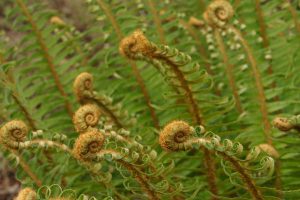
Sword fern fiddles
Ferns
- Adiantium pedatum Maidenhair Fern. Deciduous PNW native fern for moist shade, often found near waterfalls.
- Athyrium filix-femina Lady Fern. Bold deciduous PNW native fern, best in shade, will tolerate flooding.
- Gymnocarpium dryopteris Oak Fern. Deciduous native fern, spreads to form large colonies, will tolerate flooding.
- Matteuccia pennsylvanica Ostrich Fern. Large deciduous fern, prefers shade, will tolerate flooding, can become invasive if happy.
- Polystichum minutum Sword Fern. Native evergreen fern, will tolerate winter wet soil, does not like standing water. Drought tolerant in shade.
